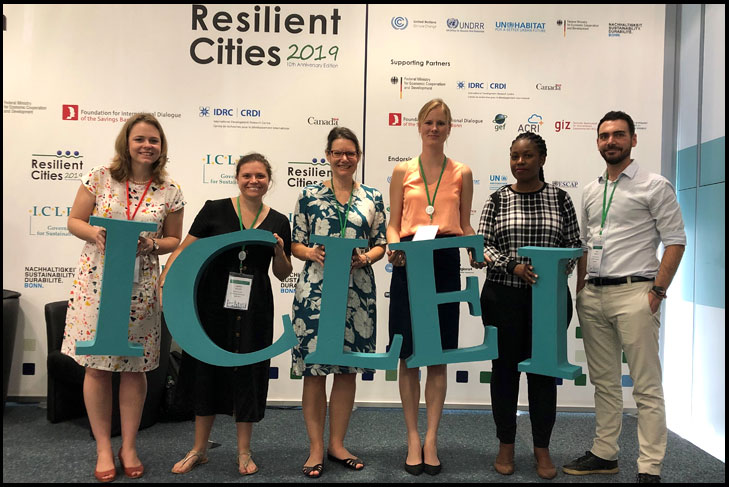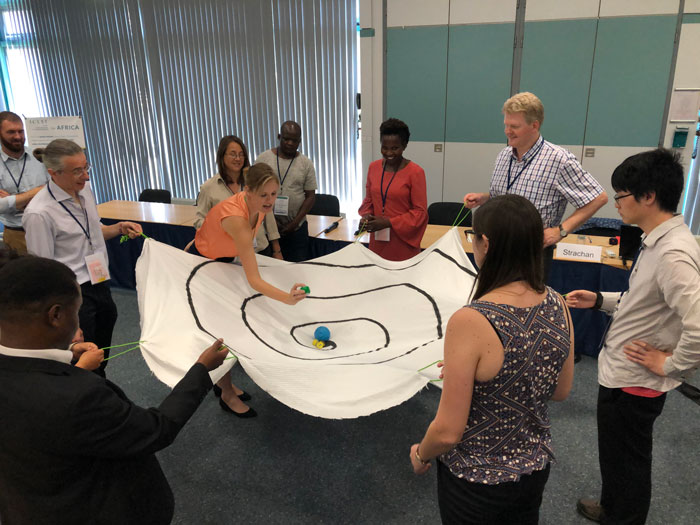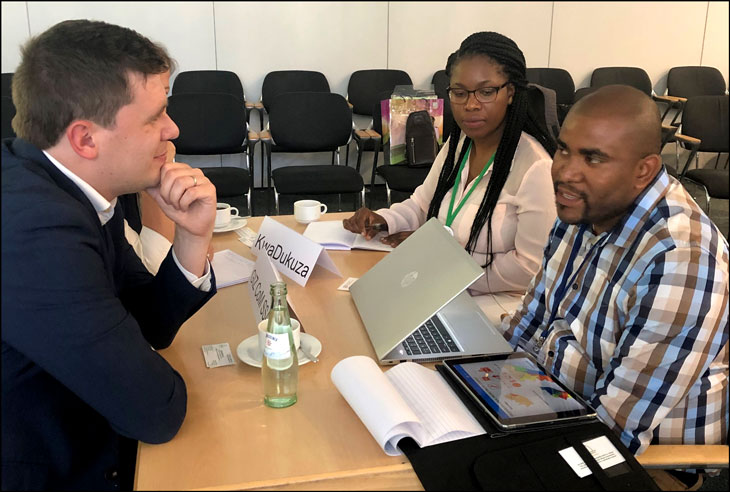ICLEI Africa Team: The team from ICLEI Africa at Resilient Cities 2019. From left to right: Meggan Spires, Jess Kavonic, Michelle Preen, Kate Strachan, Thandeka Tshabalala and Blake Robinson.
15 July 2019
African contributions valued at Resilient Cities 2019




Organised by ICLEI and the city of Bonn, the annual conference connects local government leaders and experts to discuss resilience challenges facing urban environments around the globe. It provides an open meeting space where attendants can discuss, as equals, the advancement of urban resilience.
Over the last decade, more than 4 000 participants from over 350 cities in 84 countries attended the event. This year, 500 city representatives, researchers, businesses and citizens from both the Global North and the Global South came together to share their knowledge and expertise across boundaries. Themes included disaster risk reduction, climate finance and insurance, and nature-based solutions. A multi-disciplinary team of six represented ICLEI Africa to facilitate and present eight sessions.

The most memorable sessions were practical and engaging
In line with the conference’s aim of allowing attendants to meet as equals, a games event led by our own Kate Strachan and Jess Kavonic truly succeeded in facilitating open, inclusive discussion.
‘Games for change: Unlocking opportunities and improving collaboration through effective mechanisms and facilitation tools’, exposed participants to dialogue techniques and lessons to develop effective collaboration mechanisms that enable resilience-building.
The games successfully broke down the traditional speaker-audience power dynamics so people could communicate on the same level in a truly inclusive and welcoming space. Even those reluctant to participate in a game setting let themselves be pulled in and had fun partaking in the lively, interactive discussions. In addition to the unique climate resilience solutions that arose, the session also taught participants how to facilitate equally interactive sessions back home using the games.
“What a brilliant session with ICLEI Africa at Resilient Cities!” tweeted Heidi Braun, Program Officer for the Climate Change program at the International Development Research Centre (IDRC). “The games got us all engaged and sparked important insights about why and how we can work better together to increase urban resilience. We need to talk about failures in order to succeed.”

Another session that stood out and created immense value was the Transformation Action Plan (TAP) marketplace. In this ‘match-making’ session, cities with project ideas or proposals were paired off with funders that share their goals and interests. It aimed to build relationships and improve project preparation and bank-ability. Thorough groundwork by the ICLEI team and the session’s face-to-face nature guaranteed its success.
Newly launched from ICLEI Africa
At this year’s conference, ICLEI Africa’s Urban Natural Assets (UNA) for Africa programme launched a practical poster, entitled ‘Alternative Planning Approaches for Sub-Saharan Africa’. Often cities are under resourced and do not have the capacity to deal with informality, yet in some cases 80% of our cities are unplanned, therefore we need to seek out opportunities related to informality. The approaches are organised into four categories, namely Area-based Upgrading, Urban Tinkering, Re-blocking, Scenario Planning, and Massive Small. This poster highlights alternative planning approaches that are simple to implement and that utilise existing elements in the system innovatively and can be upscaled. These include actions such as planting grass and trees, which provide shade but also incorporate greenery into the city. Click here to view the poster and see how these approaches can be implemented in your city.
A second notable ICLEI Africa launch at the conference was the 12 African Principles for Resilient Cities. Developed under the Future Resilience for African Cities and Lands (FRACTAL) project, these principles encourage context-specific engagement and action, and further strengthen our contribution to the urban resilience dialogue. Read all 12 principles here.
Africa in the front row on the world resilience stage
What stood out most from an African perspective this year was how our representatives made an impact amid experts from Europe, North America and the like. African delegates made pertinent, well-thought-out arguments that were valued by all participants. It was evident that our unique experience, African-led solutions and contributions have a significant role to play in shifting the global discourse on resilience. By nature, Africa has been practising resilience for centuries and the African delegation embraced the opportunity to share our deep, grounded knowledge with the world.
Resilient Cities 2019 was a fountain of insights and expertise and delegates went home with renewed ambition to make change happen in their cities.
"As a person coordinating climate change [action], which is an issue that involves the whole economy, I found some very important learning points that I am going to take home with me,” said Mr Lawrence Mashungu from the National Climate Change Division in Zimbabwe."



